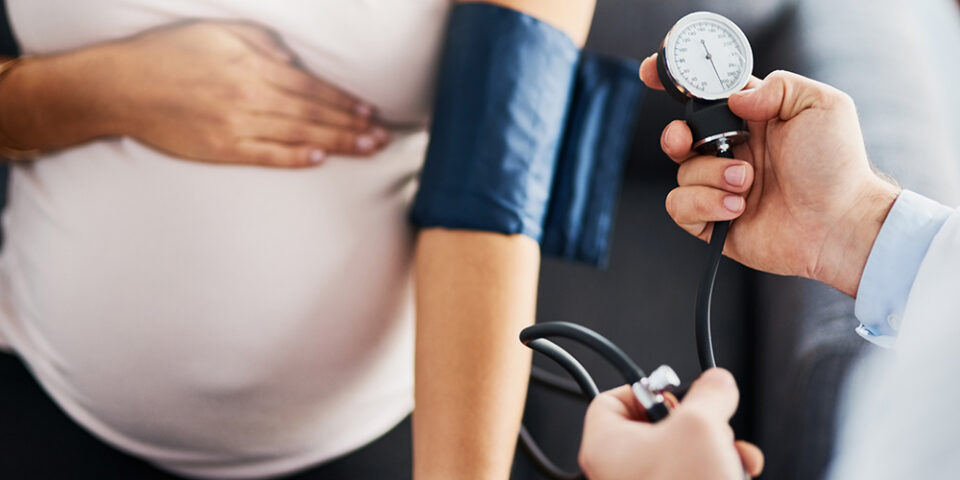How dangerous is high blood pressure during pregnancy?
High blood pressure during pregnancy isn’t uncommon, affecting up to 20% of pregnancies within the United States. Managing hypertension is an important way to prevent problems postpartum and it also helps obstetric providers to recognize the early warning signs of preeclampsia, a serious pregnancy-related disorder.
OB/GYN Erica Lowing, MD, answered questions on what you need to know about high blood pressure during pregnancy.
What is normal blood pressure vs. prehypertension or hypertension when you’re pregnant?
“High blood pressure in pregnancy is apparent when your systolic number is above 140 or your diastolic number is above 90,” said Dr. Lowing. “We consider the hypertension severe when your systolic reaches above 160 or diastolic is above 110.”
A healthy blood pressure reading involves a systolic number at or less than 120 and diastolic at or less than 80.
Dr. Lowing noted there are four categories of high blood pressure during pregnancy:
- Chronic hypertension: Existed prior to pregnancy, or is diagnosed before 20 weeks of pregnancy
- Gestational hypertension: Diagnosed after 20 weeks of pregnancy
- Preeclampsia: A related, potentially serious disorder where high blood pressure is often a symptom
- Chronic hypertension with superimposed preeclampsia: Where pre-existing hypertension is further impacted by developing preeclampsia during the pregnancy
What causes pregnancy-related hypertension?
“There’s likely a combination of factors causing high blood pressure during pregnancy, but we do know about specific risk factors that make you more likely to become hypertensive or to develop preeclampsia,” said Dr. Lowing.
According to the American College of Obstetricians and Gynecologists, risk factors for gestational hypertension and preeclampsia include:
- Your current pregnancy being your first ( maybe just “first pregnancy”)
- A gap of 10 years or more between pregnancies
- Being significantly overweight or having obesity
- A family history of gestational hypertension or preeclampsia
- Being at age 35 or older during your pregnancy
- Having had prior pregnancies with complications
- If you had preeclampsia in a previous pregnancy (a history of preeclampsia)
- Carrying multiples (twins, triplets or more)
- Pregnancy that happened as a result of in vitro fertilization, or IVF
- Black race as due to racism and inequities in treatment
- Being in a lower income bracket, due to inequities in access to treatment
Despite these risk factors, it’s still not clear why some women develop preeclampsia and others don’t.
What are some symptoms of gestational hypertension?
“Both gestational hypertension and preeclampsia can be diagnosed after 20 weeks of pregnancy,” said Dr. Lowing. “They’re more commonly seen late in the pregnancy or within six weeks after you give birth. Gestational hypertension or preeclampsia that happens before term pregnancy may indicate you are at risk for more serious complications and requires closer monitoring of both you and your baby.”
Gestational hypertension is diagnosed when:
- The pregnant person has a systolic blood pressure of 140 mm Hg or higher and/or a diastolic blood pressure of 90 mm Hg or higher
- High blood pressure occurs for the first time after 20 weeks of pregnancy
- The patient had normal blood pressure before becoming pregnant
Most patients with gestational hypertension have only a small increase in blood pressure. Unfortunately, some will develop severe hypertension (defined as systolic blood pressure of 160 mm Hg or higher and/or diastolic blood pressure of 110 mm Hg or higher).
These women are at risk of very serious complications.
What are the main symptoms of preeclampsia?
“The first sign leading to a diagnosis of preeclampsia is often a high blood pressure reading,” said Dr. Lowing. “If your blood pressure reads high, it may be checked again to confirm those results, followed by a urine test to check for protein or tests to look into how well your liver and kidneys are working and to measure blood platelets.”
Preeclampsia can develop quietly without you being aware of it.
The most common symptoms of preeclampsia include:
- Swelling in the face or hands
- A headache that will not go away
- Seeing spots or sudden changes in eyesight
- Experiencing upper abdominal pain or pain in your shoulder
- Nausea or vomiting in the second half of pregnancy
- Sudden weight gain
- Difficulty breathing
If you have any of these symptoms, especially if they develop in the second half of pregnancy, call your obstetric provider right away. If preeclampsia goes untreated, symptoms listed above may worsen, and you may develop fluid in the lungs, low blood platelet counts, impaired liver or kidney function or a severe headache. Severe symptoms such as seizures or stroke may also occur.
Why is gestational hypertension a problem?
“Hypertensive disorders of pregnancy can have short-term and long-term effects on your pregnancy, but also on your own ongoing health,” said Dr. Lowing.
Those who have had preeclampsia, especially if their babies were born prematurely, have an increased risk for stroke, heart attack, kidney disease and high blood pressure in the future. High blood pressure during pregnancy or preeclampsia is more likely to happen in future pregnancies if you’ve had it once.
That’s why it’s important to speak with your obstetric provider and take steps to manage the disorder or prevent it.
Can you manage gestational hypertension at home? Is medication required?
“Managing your hypertension depends on your risk factors and specific diagnosis,” said Dr. Lowing. “It’s going to be different from patient to patient, so even if you have a family history, the way that your family member treated their own hypertension may not be what your provider thinks will work for you.”
Sometimes, all that’s needed is monitoring your baby’s kicks and activity, monitoring your own symptoms, and having more frequent check-ins with your provider.! Your provider may ask you about how you’re staying active or give you advice on healthy eating options that can help to control blood pressure. In other cases, you may be asked to track your blood pressure at home and keep the provider informed as to the results.
Severe preeclampsia may need to be treated in the hospital.
Does high blood pressure during pregnancy go away on its own after the baby is born?
“Pregnancy-induced hypertension often returns to more normal readings after the postpartum period is over,” said Dr. Lowing. “But not always. Other patients may find their blood pressure stays high in the future.”
If you had gestational hypertension or preeclampsia, keep in mind as you take care of your health that you may be more likely to have high blood pressure in the future.
Healthy eating, weight management and regular exercise may help manage or prevent high blood pressure during pregnancy and beyond.
Find an OB/GYN provider who’s right for you
When you’re ready to grow your family, choosing the right provider is important. Learn more about our obstetricians, midwives and nurse practitioners.
Find a Provider

